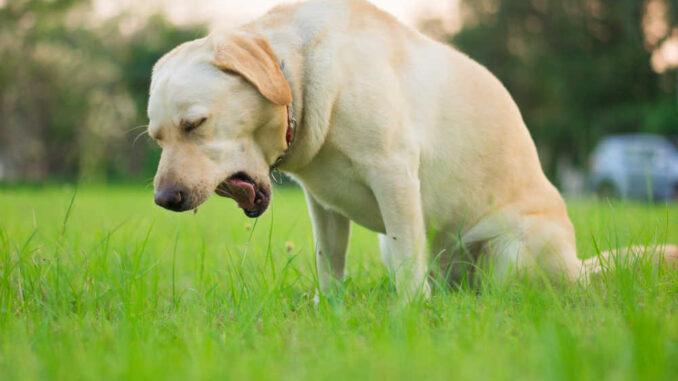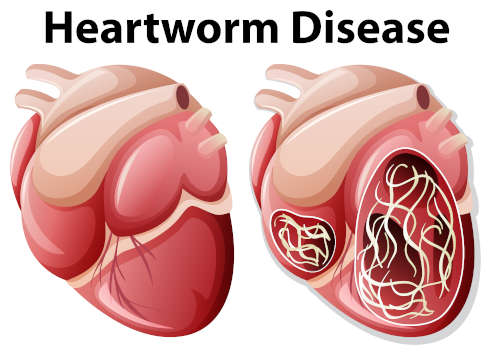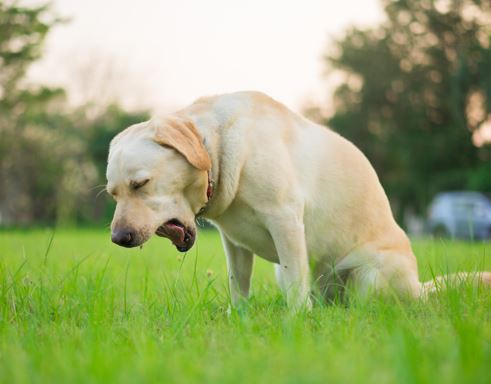
This article was updated on May 16th, 2023
I think that one of the things which surprises an owner, is what a dog’s cough sounds like. They do not politely cough, trying to make a quiet noise. Their cough is loud and proud and often sounds like a retch or a gag. So, coughing and dry heaving are often confused with each other
Dry heaving is something I’m presented with commonly during my daily consults, and there can be a wide range of causes. The main things which affect how I examine and treat the dog, include their age and how they are acting otherwise. I am going to be far less worried about a young, boisterous dog who has just started heaving, in comparison with an older dog who has been heaving for a long time.
Dry heaving in dogs: it is serious?
Most of the time, dry heaving is short lived and of no concern. When we consider the things our dogs hoover up and how close they get to the faces of other dogs, it is little wonder that they commonly swallow things they shouldn’t and pick up infections.
However, there are instances when dry heaving is a true emergency. The most obvious occasion is when a dog is dry heaving due to a life-threatening condition called ‘bloat’. However, these dogs will have other signs including a bloated abdomen, restlessness and drooling. Let’s review the most common causes when your dog otherwise appears to be fine and acts normally.
What are the common causes of dry heaving in dogs? (when the dog otherwise acts normal)
Dry heaving in a dog who has no other signs could be indicative of a few things. Let’s take a closer look at some of the more frequent issues diagnosed:
1. Kennel Cough
Kennel cough is a bit of a misnomer, as dogs who have never been in kennels can become infected. It can be picked up anywhere that other dogs go, including the dog park and groomers.
Infected dogs tend to be young and unvaccinated against kennel cough. They are generally otherwise well, despite a honking cough that sounds like a gag. Some dogs might be a bit lethargic, off their food and a mild fever can develop.
Treatment is often not needed, and dogs recover within 1-2 weeks. However, a vet check is still wise so we can ensure we have the right diagnosis. From home, we can help dogs by using body harnesses instead of neck collars, keeping the air at home well ventilated and offering a little honey a few times a day.
As dogs are highly infectious, do keep them away from other dogs until their cough has gone.

2. Gastrointestinal Issues
A myriad of GI issues can lead to retching, heaving or gagging. It is a sign of nausea and dogs can experience nausea due to e.g. a food intolerance, dietary indiscretion (eating something they should not have) or an infection. There may be subtle accompanying signs such as a reduced appetite or slightly runny stool.
With mild and short-lived GI issues, symptoms soon resolve. We can help speed up the process by offering a bland diet and encouraging our pooch to rest. Should more worrying signs occur – such as vomiting or food refusal – a trip to the vet is sensible.
Some dogs may benefit from medicine such as anti nausea medication and antacids, to settle their stomach and get them eating again.

3. Foreign bodies in the throat
When a dog is brought in gagging and heaving, the first thing an owner will ask me is if they could be choking. As long as a dog can breathe, swallow and eat, we know they are not choking. However, there may well be something lodged in their throat that is causing them discomfort.
Some of the most common items we find that cause dry heaving include long blades of grass and grass awns in the throat. When sedated, we can examine the throat and remove anything that is there.
As foreign bodies are very uncomfortable and can lead to infections and abscesses, the sooner they are removed the better.

4. Parasites
Some parasites such as heart worm, lung worm and even round worm can cause a ‘verminous cough’, which can sound like a gag or heave. There may be other symptoms such as diarrhea, reluctance to exercise and abdominal swelling. However, these signs are easily missed, particularly in the earlier stages of the infestations.
Parasites are particularly common in those who have not been given routine parasite prevention, who are raw fed and who spend a lot of time outdoors. Heart and lung worm are particularly serious, and can make dogs very unwell if not addressed urgently. The sooner the dog is treated, the better their prognosis.

5. Laryngeal paralysis
In the earlier stages of laryngeal paralysis, the most notable sign is usually a gag or dry heave that doesn’t go away. As the condition progresses, other signs start to occur. These include a hoarse bark, trouble exercising and noisy breathing.
Breeds including the Labrador, Dalmatian and Siberian Husky are more often affected. It can be linked to endocrine disorders such as hypothyroidism. Typically, it occurs in senior dogs. So, a dry heave that is not going away in a larger, older dog, should make us suspicious of this condition.

If my dog is still acting normal, should I see the vet?
Dry heaving is a sign that there is something amiss with our dog. For most dogs, signs won’t last long and they’ll improve quickly with no intervention. However, for some dogs, dry heaving is a sign of something much more serious that does require urgent vet attention. For this reason, even if your dog still seems well, a vet check is a good idea.

How serious could it be?
As mentioned, for most dogs, heaving will just be a sign of a mild viral infection or nausea. However, it could indicate that something is stuck in their throat, and we’d want this removed ASAP. It could also be a sign of something more worrying, such as laryngeal paralysis or heart worm, so it is important you have your pooch assessed.
6 tips to help your dog at home
When dry heaving, it is sensible to do the following things from home:
•Ensure the air is not dry, and is well ventilated and free of dust, smoke and cooking fumes
•Switch from a neck collar to a body harness when outside
•Encourage rest and keep exercise to a minimum
•Keep your dog isolated, in case he may be infectious
•Offer a teaspoon of honey a few times a day
•Avoid hard or ‘scratchy’ foods like kibble
Veterinarian diagnosis & costs
Your vet will firstly check your dog over, listening to their heart and lungs and looking inside their mouth. In some cases, they’ll want to sedate your dog to get a better look at their throat and airways. Less commonly, further tests such as hormonal blood test and chest x-rays may be advised.
For a simple consult and some medication (such as anti inflammatories), the cost should stay low at about $60-80. However, the cost of sedating a dog to examine their airways and/or take an x-ray, will bring the bill up a few hundred dollars.
What are the signs and symptoms associated with dry heaving in dogs?
•Coughing and gagging. So, when a dog gags but does not vomit, this is called dry heaving. Coughing, gagging and dry heaving are all closely linked and occur together.
It helps to keep the air humid and clear, and a little honey can soothe an irritated throat.
• Restlessness and discomfort. Dogs may have discomfort in their throat and may be disturbed by their dry heaving, particularly if it is occurring as they try to sleep. We may notice they act a little clingier with us. We should try to offer comfort, and allow them to rest as needed.
• Vomiting and regurgitation. Lots of heaving and gagging can lead to food being brough back up, even if a dog is not nauseous. This is not uncommon when a dog has kennel cough, so feeding bland food little and often can help.
Frequently Asked Questions
• Is dry heaving contagious?
When the dry heaving is caused by an infectious disease such as Kennel Cough, it can be contagious. This is why we should keep our dogs away from others while heaving or coughing.
• Can dry heaving lead to death in dogs?
Rarely, dry heaving can be a sign of a life-threatening condition. Heart worm, for example, can be fatal as it can cause severe lung disease and organ damage.
Disclaimer: This website's content is not a substitute for veterinary care. Always consult with your veterinarian for healthcare decisions. Read More.


Be the first to comment